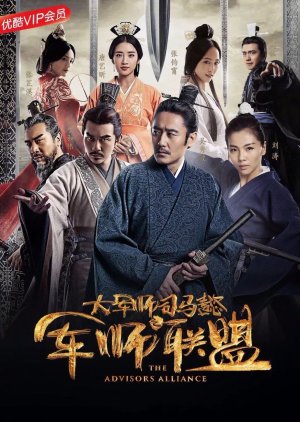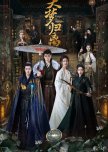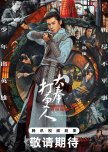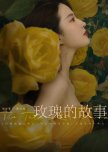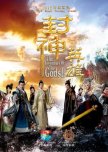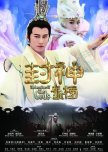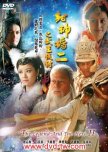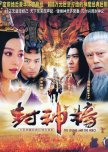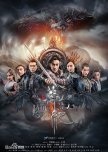
The king maker is king of kings.
Note: There are some statements of well known. historical facts in this review. They are by definition not spoilers but be warned in case you are unfamiliar with the history of this period.Sima Yi, courtesy name Zhongda. History's most cunning grifter, a man who stole a throne and an empire more than once! I always enjoy dramas like this because they bring larger than life historical characters to life and deflate them into close to normal human beings. I never imagined Sima Yi would be portrayed as such a timid, groveling, deceptively harmless and well, just ordinary fellow. Or that he would be so terrified of his wife. That just cracked me up. Audacious.... sacrilegious even.... love it!
The drama opens with Zhongda, a brilliant scholar and tactician, welcoming his firstborn son Sima Shi into the world. His father Sima Fang is a shrewd and influential minister of the Han Imperial Court. By then, warlord Cao Cao had already openly seized power and repeatedly bullies the Han Emperor into a sniveling, terrified puppet. Zhongda unwittingly catches the eye of Cao Cao as he deftly extricates his father from a dire situation. He goes to extreme lengths to avoid serving Cao Cao who is both keen to make use of his talent and wary of it at the same time. Recognizing his innate cunning and ambition, Cao Cao regards him suspiciously as a double edged sword and comes close to killing him dead many times.
Initially I was surprised and a little bit underwhelmed to see such a timid and groveling Sima Yi. But the layers peel away very satisfactorily to reveal his hidden ruthless nature, his scheming and bold ambition. He is a king maker, someone capable of securing the throne for Cao Pi, the less favored son against Cao Cao's own wishes. He then proceeds to steal an empire for Cao Pi but this part seems whitewashed. I doubt Liu Xie was really that eager to so simply hand over the throne. Not surprisingly, he also intervenes in Cao Pi's succession plans. At that point, it is clear that Sima Yi the king maker is king of kings; that three generations of Cao rulers' succession is determined by this man. Notwithstanding his many contributions, Sima Yi is portrayed as a selfish and cunning character who parleys his own interests ruthlessly. He manipulates two revered ministers into sacrificing themselves to ensure Cao Pi's ascension, but it is clear his primary motive is to save his brother's life.
Sima Yi's great rivalry with Yang Xiu is rivetingly played out in the bitter succession battle between Cao Pi the worthy son and Cao Zhi the favored son. Both are ambitious and brilliant tacticians but they couldn't be more different in nature. Yang Xiu is arrogant, outspoken and extremely intuitive. He cannot help showing off, often over estimating himself and underestimating his enemies. This cost him his life and Cao Zhi the throne his father so badly wanted to give him. In sharp contrast, Sima Yi avoids attention and while he is is often underestimated, he has a healthy respect for his enemies capabilities. His final conversation with Yang Xiu, someone he empathized with, respected and learned from as a worthy opponent illuminates how Sima Yi managed to hang on to his head through many dangers. I have not watched Wu Xiubo before and I was hesitant about him as he is not the image that jumps to mind when I imagine Sima Yi. My concerns faded almost immediately and I cannot think of a better actor to play the role of Sima Yi as characterised by this production.
This drama largely sticks to history in terms of the key events and leading characters of the day. Told chronologically, the drama unavoidably peaks with the exit of the veteran actors who also play the most interesting figures of the day. This drama's highlight for me was Xun Yu's (played by none other than the fabulous Wang Jin Song) opposition to Cao Cao's decision to form his own feudal state. Their bittersweet final exchange that touched upon their long friendship, mutual respect and alignment that turned into reproach and disappointment is a powerful, memorable and compellingly acted drama moment that only two actors of such caliber can deliver. I can recommend watching this drama for that scene alone. I feel pity for anyone attempting the role of Cao Cao after Yu Hewei. I almost wept with joy at the perfection of his rendering of Cao Cao in his twilight years; the ambitious warlord stymied by the limits of his own mortality and torn by his succession dilemma between his most worthy son and his most loved son. Needless to say he is as bad a dad as he was as good a warlord and statesman. Ironically, Cao Cao sows the seeds of the downfall of his own empire as Cao Pi is also a terrible father who also messes up his own heir. Whereas the Sima family in sharp contrast are paragons of Confucian family virtue, the foundation of a moral society.
When it comes to the inner palace and familial relationships, the storytelling embellishes wild history and heavily fictionalizes the historically insignificant aspects. I was sad but unsurprised to see Cao Pi's deep friendship with Zhongda become distrustful and utilitarian after he becomes emperor. While I understand the audience appeal, it is well known that Zhongda's relationship with his wife was much less cordial but I love Liu Tao and was happy to buy into this Disney version. However the whole song and dance with Lady Bai and how Zhongda was "forced" to accept her went too far and just made me roll my eyes. I expect a man of that status in those times to have concubines I don't see the need to waste so much time suggesting he meant to be monogamous when he definitely was not. I also was not compelled by the chemistry between Cao Pi and Lady Guo but at least they didn't try to suggest he didn't have a harem. Lady Zhen's story could well just be speculative history but she is the character I felt the most sorry for in this drama.
The Advisors Alliance is the first instalment of Sima Yi's story and ends with Sima Yi retiring from active duty under Cao Pi. By then, Sima Yi and his proteges had succeeded in pushing through agricultural and structural reforms that made Cao Wei great and restrained the power of the Cao clan warlords. It is a fascinating account of how an understated and often under estimated Sima Yi was ruler in deed if not in name. His machinations paved the way for the Sima clan's rise in influence which eventually led to the founding of the Jin dynasty, which many still argue was not a legitimate state. I enjoyed this enough to rate it an 8.5 and will probably go on to watch the second season Growling Tiger, Roaring Dragon which focuses on his rivalry with Zhuge Liang.
Esta resenha foi útil para você?

Esta resenha pode conter spoilers
First, it is worth watching because of its cinematographic quality, the contrast of lights and colors, as well as its subliminal messages.Cao Pi and his wife, they don't love each other, but destiny wants to connect them, there is a saying in China that there is a red wire that connects each person that can break, but never separates, in the sense that they try to stop the connection , but the tie ties them together.
Strong women are presented to us as the wife of Zhang Chunhua (photo from the beginning) of the main character, but when everything seemed to go well in the drama, it was when the drama fell, with the death of Cao Cao (he is the leader Houseold, Cao's father) Li, Exis in Chinese history (photo below) and Sima Yi gets involved in a love triangle. - And I was thinking that this would be a better drama than Nirvana in Fire, still dreaming of a drama like this.
Even so, I still suggest that you see it because of the Cao Pi-Guo Zhao shippe. The relationship is very worthwhile. I hope part 2 can bring us more about strategy and nation building (and the sons of Sima) instead of unappetizing love triangles.
Esta resenha foi útil para você?
Also the cinematic quality of the drama is worthy of all praise. The director's emphasis on the details was amazing. But this is definitely not a drama for pleasure and fun. I feel that the fictional historical plots, like "Nirvana in fire", are closer to me, due to the strong emotions and justice at the end. Anyway I highly recommend "Alliance of Advisors" to a mature audience who will be able to appreciate it.
Esta resenha foi útil para você?

However, some of the comedic, slice-of-life & lovey-dovey scenes are novel add-ons which can potentially spoil the gravitas of the historical writing (& nope, Xiahou Dun didn't simply just walked out of Sima Yi's front porch to die on the spot) Extensive usage of classical Chinese poetry can become slightly overwhelming for first-time viewers & in-depth background research may be required before one can fully make sense of the characters, the factual battles or even the heavy poetic musings, but on its own, it is a moderately easy drama to follow along. If you are into Chinese history & want to know more of the giants manning behind each of the iconic 3 Kingdoms, do not give Advisor's Alliance a miss.
(*As an added bonus, one should watch 英雄曹操 (aka "Great Hero Cao Cao") from 2014 to familiarize oneself with the inner workings of the Cao clan before diving head-on with Season 1.)
Esta resenha foi útil para você?

Grand ambitions, disjointed execution.
‒Overview‒Advisors Alliance is Three Kingdoms historical drama that does many things well and may be a terrific viewing experience for many. However, its storytelling and treatment of characters may result in significant disconnect for viewers who are already familiar with the story.
‒The Good‒
- Expensive production with gorgeous indoor and outdoor sets and costumes to match.
- Expansive and gripping battle scenes
- Solid lineup of actors with great performances in various scenes
- Political ploys, intrigues, and dialogues that much cleverer than the average show
- Could be confusing, but also really novel and interesting to those who are not familiar with the story of Three Kingdoms
‒The Questionable/Bad‒
- Not true historical - the drama tries to straddle the line between a prestige historical and a lighter costume drama. But the injection of a lighthearted moments detracted from the gravity of show and interfered with character building of these serious historical figures
- The storytelling often felt inconsistent and fragmented. While the show did a decent job in depicting key moments in history, it was less adept at tying them into a powerful cohesive narrative. The setup and transitions between different events felt unpolished‒even if the scenes are well-crafted, you can't just duct-tape them together if you want to make a top-tier historical.
- The same goes for the characters and acting. When broken down by scenes, the characters and acting are decent, even spectacular. But since the overall character building feels inconsistent, the end result is actually disconnect and disbelief, especially for ones like Cao Cao, Sima Yi, and others where there already exists a prevailing conception. Sima Yi was flattened to be someone who's too loyal and innocent, which doesn't fit his historical or presumptive reputation in the show. Moreover, the time jumps are narrated rather than depicted and fails to depict the important changes to characters, further exacerbating the perception of incongruency. Yu Hewei's Cao Cao was meticulously acted. Yet the show fails to first establish the commendable aspects of this complicated figure, making the power and respect he commanded seem unconvincing. I loved Liu Tao in Nirvana in Fire. But she was unfortunately stuck with a female character that mostly just served as a comedic prop and someone to henpeck Sima Yi.
I dropped at ep 19 even though it's a decent show because I already have a good idea of the story and my appreciation will only go down from that point. Unlike the second volume, 'Growling Tiger, Roaring Dragon', this covers a lesser known and less iconic portion of the Three Kingdom story.
The end result was something that was at times brilliant in tactics, but messy in strategy to use a Three Kingdoms analogy. Overall it was a 7.0 at ep 19. In comparison, Secret of Three Kingdoms, despite some similar problems and some plot issues in later episodes, actually did a better job in crafting more compelling characters and story for the earlier episodes. Of course, the most iconic Three Kingdoms dramas are the 1994 and 2010 versions, which I highly recommend checking out. 2010 version is best for international and younger viewers even though the 94 version is considered the undisputed king in China.
For review of Part 2, Growing Tiger Roaring Dragon: https://mydramalist.com/profile/MyLangyaList/reviews/407886
‒Category Ratings‒
- Overall - 7.0
- Plot - 7.5
- Theme / Concept / Impact - 7.0
- Acting - 8
- Visuals - 8.5
- Audio / Music - 8
- Rewatch - 6
- Cultural/Topical Accessibility - 7
- Subtitle quality - 8
Esta resenha foi útil para você?

Esta resenha pode conter spoilers
This review is for Advisor's Alliance, and Growling Tiger, Roaring Dragon
I just wrote a long arse review that I mistakenly deleted and now I'm crushed.XXXXXXXXXXXXXXXXXXXXXXXXXXXXXXXXXXXXXXXXXXXXXXXXXXXXXXXXXXXXXXXXXXXXXXXXXXXXXXXXXXXXXXXXXXXXXXXXXXXXXXXXXXXXXXXXXXXXXXXXXXXXXXXXXXXXXXXXXXXXXXXXXXXXXXXXXXXXXXXXXXXXXXXXXXXXXXXXXXXXXXXXXXXXXXXXXXXXXXXXXXXXXXXXXXXXXXXXXXXXXXXXXXXXXXXXXXXXXXXXXXXXXXXXXXXXXXXXXXXXXXXXXXXXXXXXXXXXXXXXXXXXXXXXXXXXXXXXXXXXXXXXXXXXXXXXXXXXXXXXXXXXXXXXXXXXXXXXXXXXXXXXXXXXXXXXXXXXXXXXXXXXXXXXXXXXXXXXXXXXXXXXXXXXXXXXXXXXXXXXXXXXXXXXXXXXXXXXXXXXXXXXXXXXXXXXXXXXXXXXXXXXXXXXXXXXXXXXXXXXXXXXXXXXXXXXXXXXXXXXXXXXXXXXXXXXXXXXXXXXXXXXXXXXXXXXXXXXXXXXXXXXXXXXXXXXXXXXXXXXXXXXXXXXXXXXXXXXXXXXXXXXXXXXXXXXXXXXXXXXXXXXXXXXXXXXXXXXXXXXXXXXXXXXXXXXXXXXXXXXXXXXXXXXXXXXXXXXXXXXXXXXXXXXXXXXXXXXXXXXXXXXXXXXXXXXXXXXXXXXXXXXXXXXXXXXXXXXXXXXXXXXXXXXXXXXXXXXXXXXXXXXXXXXXXXXXXXXXXXXXXXXXXXXXXXXXXXXXXXXXXXXXXXXXXXX
Esta resenha foi útil para você?

